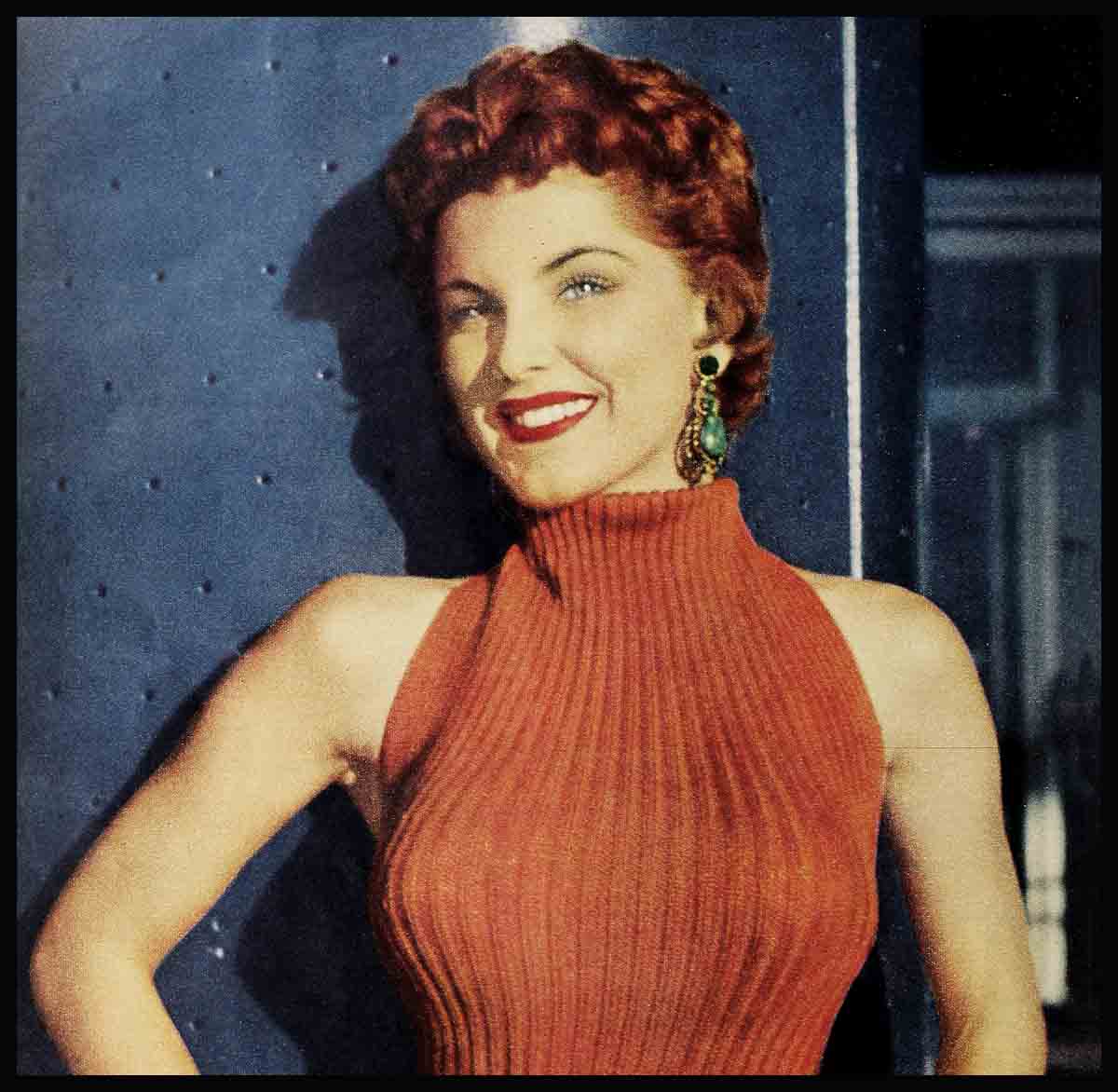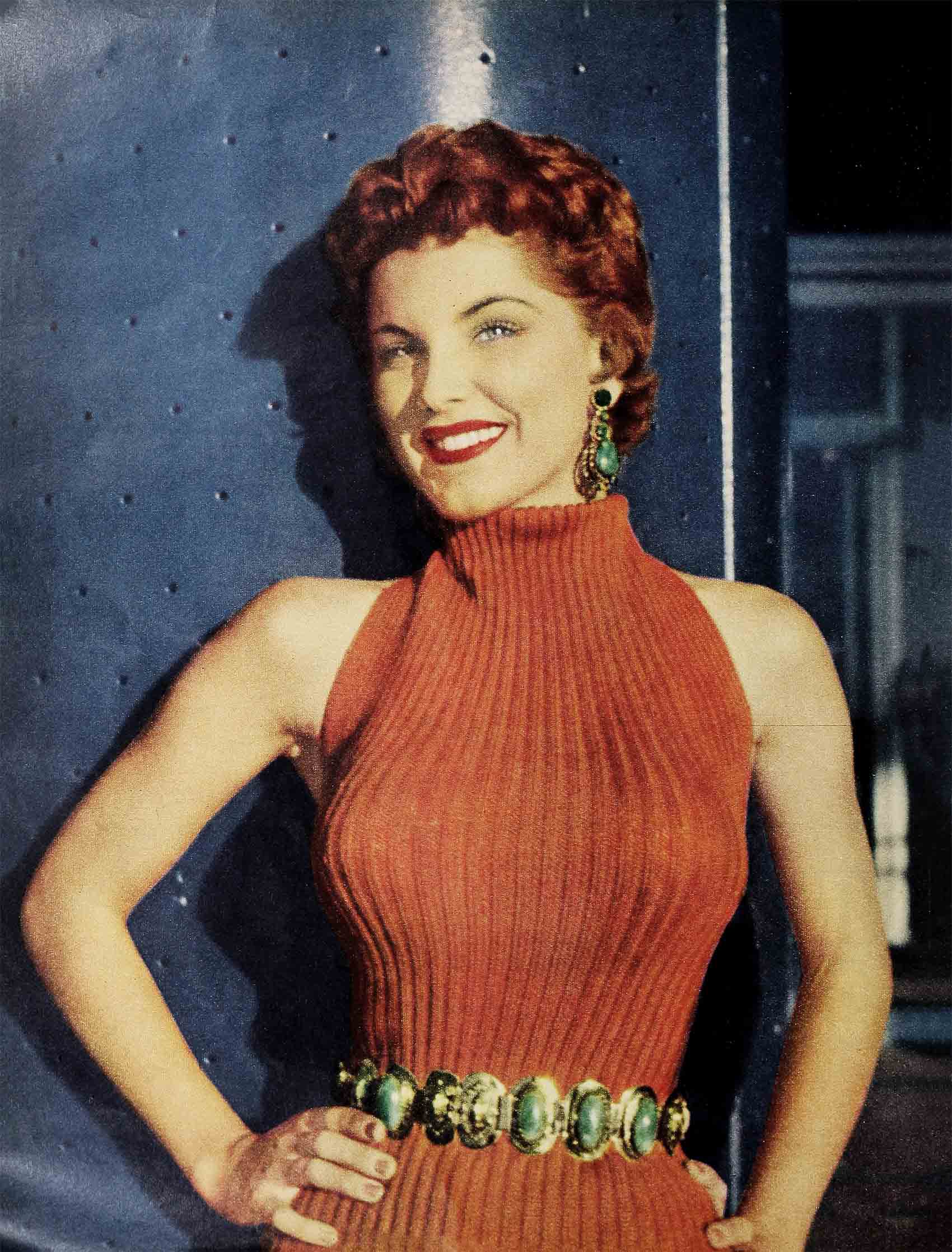
Debra Paget: “Why I Went Redhead?”
Four years ago, I got a bad scare. George Jessel, who was to produce Anne Of The Indies, in which I had been cast, suggested that I change the color of my hair for the role—to red! I was startled by the request and pretty well upset. It’s a major step for any girl to take, of course. But when you are in a profession in which your appearance can make or break you, it’s triple major!
But then a counter order came down from Mr. Darryl Zanuck, the head of our studio.
“I don’t want a hair on that girl’s head changed!” he told Mr. Jessel. Mr. Jessel passed the word on to me. I heaved a sigh of relief and remained a brunette. Yet only a few years later I was to turn redhead all by myself. That’s women for you. That’s this woman, anyway!
“Today I am a redhead and it is one of the happiest things ever to happen to me. The new color to my hair seems to have triggered a big change; I feel like a new person. I have discovered a new zest, not only in dressing my new self, but just in being my new self. I feel that I have added immeasurably, and in many, many ways, to the old Debra.
There was even a mystery reaction at first. People kept telling me that I not only looked better, I sounded better. Then, of course, I realized that with my new appearance I had adopted a new personality; nine girls out of ten would do the same thing, I am sure. You unconsciously try to live up to yourself—if you can only get yourself to looking right!
When I was a small girl, and even during my first months at the studio, I was a strawberry blonde. Then my hair began to darken quickly. Fortunately this was right for the kind of parts that came my way; I was a Polynesian, an Indian, a Creole, an Oriental and an Egyptian—but never a blonde. It was all right with me at first, but after a few years I thought I saw a sort of relationship between the color of the hair and the kind of part which came my way. I think my mother got the idea first, to tell the truth. I think that’s what made her figure it would be a good idea to encourage producers to think of me when they had roles other than Indian maidens and temple dancers. And from her own experience on the stage, when she was known as Margaret Gibson, she knew that the most effective encouragement would be a whole new appearance. There was only one trouble with this. I balked!
Mother with her years of show business behind her, knew what she was about. I had to be reasoned into it. She explained:
“Men tend to see a woman as she is, not as what she can become. That’s why women are always trying for something new in their appearance, in their ways, in their interests; because they know it’s their job to show that they are capable of growing; no one is going to guess it can happen. Producers are men. In your case—well, they still think of you as the little girl they see around the studio, wearing peasant blouses and bouffant dresses, who plays Indian maidens. You have to show them you are getting to be a young woman who does very nicely in a form-fitting gown and who can live up to the more sophisticated roles.”
“Well, can’t I just wear the formfitting dress as a brunette?” I asked.
“Yes, but then in their minds you would probably still be the little Indian girl, but now trying to look sophisticated,” she answered. “Make the change complete. Be a new Debra altogether!”
“Be a new Debra altogether!” It is powerful medicine for any girl to be a new edition of herself! But still I held back. I thought of it, I played with the idea, but I didn’t have the courage to go ahead. Mother would talk. I would listen. But then the thought of remodeling myself would frighten me.
Then one morning I heard that Jeanne Crain had gone redhead. I will be very frank and admit that I was impressed by this; especially when I saw Jeanne. She was a bright, radiant, new personality.

Now my mother revived the idea, and this time I didn’t say no, nor yes, either. I thought I would go along, but guardedly. So I said, “If I could be the same kind of redhead as Jeanne, get the same shade, maybe I’d consider it.”
Mother was way ahead of me. She whipped out the name of the very place Jeanne had gone, she said. The Bentley Beauty Shop.
“The first thing I did after seeing Jeanne was to find out where she had her hair done,” Mother said.
And while I was still wondering about it, Mother went to the phone and made an. appointment. In no time I was no longer a brunette. My hair was flame red!
The first thing that happened when I went back to the studio was that I saw Mr. Zanuck coming up the studio street toward me—and I ducked! I remembered what he had told Mr. Jessel, and I just hadn’t the nerve to face him. Next I bumped into Mr. Charles LeMaire, the studio’s head wardrobe designer, and while I held my breath, and figuratively stuffed my fingers into my ears to keep out a critical blast—he started raving!
“It’s wonderful!” he said. “The best thing you could have done!”
He talked to me about getting it cut short in the back, but keeping it fluffy elsewhere, ard went away still raving over it. From that moment on I began to perk, really perk! I looked like a redhead. Something seemed to say, “Act like one!”
Of course, I was still sensitive to general reactions. They were very interesting in the way they reflected personal philosophies. For instance, all the old male friends of our family, plus all the older or more mature men we knew in the studio, who were not in the creative end of the business—like the studio policemen, for instance, or studio technicians—didn’t like my new hair at all.
“Oh, no, Debra! Change back to what you were!” cried one of them—and that’s what they all felt. But all the producers in the studio (except Mr. Zanuck, who still hasn’t seen it!), the directors, the writers, the other players, plus all the girls I knew—including many who aren’t connected with show business—were highly in favor of my new coloring.
For some days I was puzzled by this sort of group thinking; one class of people hating my new hair color, the other liking it. And it was then that I understood the reason behind it had to do with how each group was motivated.
The studio policeman and technicians thought of me as they’d think of any other old friend, but not in terms of my duties, and certainly not in terms of the successful pictures I would have to make to continue on the studio’s payroll. They were veteran employees who had nothing to do with the films being made, and their minds didn’t run in that direction. But the producers and the directors were more like me. They knew they had to keep coming up with something new. They could well understand why it would be important for me to shine in a novel, bright light.
Now I was beginning to dig behind any words of praise or criticism I was getting for what they were based on. When I realized I was doing this, it flashed into my mind that I was finally growing up, and that this was a special bonus for me from my new hair color! Up till then I had heard people tick without knowing why. Now I knew that if I listened to their ticking, and figured out why they were ticking just so, I might be able to be the kind of redhead who knows exactly what time it is in her life!
I hope I don’t sound mixed-up, but what I am trying to say is that you can’t always depend on your friends’ advice as being the best advice for you to follow; you have to ask yourself why they think as they do, and if what they want for you is what you want for yourself! In my case it wasn’t.
For instance, I had always been a quiet person, the kind who relies on “yes” and “no” more than any other words in the language. It was my nature to be quiet, but it wasn’t to my liking to be that quiet. I had always wished to be able to talk interestingly, but somehow I never seemed able to.
It’s different now. I do get away with a bit of a discourse these days—and it started when I stopped being brunette!
One of the magazine writers I know, but whom I hadn’t seen since my “dark” days, was quite surprised. “You know, you seem to be able to express yourself so much better these days,” he said.
It was true. And I knew why. It’s because redheads have so much in them they have to express! And don’t tell me I’m not’a redhead. If I have found out one thing, it is that when you change your hair to red you become a 100% redhead.
It’s really funny how you can go around making new impressions. And not only on new people, but new, fresh impressions where you already had made indifferent ones!
Honest! The fellow who smiled so-so yesterday gives you that old eyes-lit-up smile today!
Jeff Hunter, with whom I worked in White Feather and who isn’t given at all to soft-soaping, stopped short when he saw my new flaming locks, and just plain looked impressed. It was the nicest compliment I could have had.
Mr. Henry Koster, who directed me in Stars And Stripes Forever at 20th Century-Fox, took one look at the new hair color when he saw me in the commissary and said just, “Ah-h-h!” But he made that sound like a whole bookful of praise.
Dale Robertson, whom I hadn’t seen for months, stopped me in the street to lavish approval that I knew came straight from his Oklahoma heart.
These are the people with whom I must work, and whose endorsements I must have if I am to continue successfully in my business. When they reveal that they think I am right, I am right! No wonder I can talk, and open up to strangers, instead of freezing up. I have the confidence that is born of security; and it all came that day when I had my hair turned red!
Mother thinks that as a redhead I may get the urge to go out on dates, something I haven’t done up to now. I don’t know. That never was a matter of the color of my hair. I simply see no sense of frittering away time on someone in whom I am not completely interested. And I am not completely interested in anyone yet.
When he does come along, when I see the one I want, he had better look out. I won’t hang back then.
And there is one thing he can be sure of. He will be going out with a redhead.
An assistant director we know told Mother the other day that he thought I should go back to being a brunette.
“Over my dead body,” said Mom.
Over mine, too!
THE END
—BY DEBRA PAGET
It is a quote. MODERN SCREEN MAGAZINE JUNE 1955





No Comments